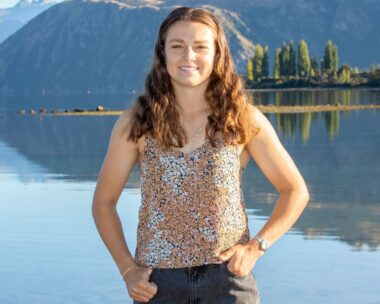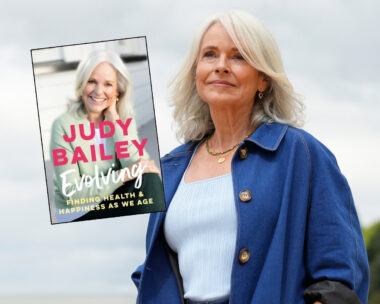We’re lucky enough that many of the rights and freedoms we enjoy today have been won thanks to pioneering feminists, like Kate Sheppard. But it’s not yet time to hang up the placard – there’s still plenty that needs doing. We take a look at the next generation of feminists in New Zealand and how they’re empowering women today.
Lizzie Marvelly

Singer-turned-media guru, Lizzie Marvelly is the founder of Villainesse, an online media project that aims to create smart, ‘no-filter’ media for young women.
In 2015, less than six months after launching Villainesse – she went live with the project’s first major campaign, #MyBodyMyTerms, which aimed to spark conversations around victim blaming, revenge porn, consent and sexual violence. The globally successful campaign gained attention from the likes of The Huffington Post, Cosmopolitan and BuzzFeed, and its videos were viewed more than 500,000 times. Lizzie later launched the 12-part web series, The Real Sex Talk, in 2017 for 13 to 18-year-olds, which discusses all things to do with sex, including the effects of porn, same-sex relationships and transgender people.
Her debut book, That F Word, was released in August and shares Lizzie’s experience of being a woman in New Zealand.
Sisters United

Parris Goebel may be a familiar face, thanks to her work as a choreographer, dancer and artist, but she is also empowering young women with her sisters Kendal Collins and Narelle Ngaluafe.
The trio are the founders of Sisters United, a family-based organisation that helps build self-esteem, body confidence and cultural identity among young Maori and Pacific women in Auckland through dance, photography, music and spoken word workshops.
“I hope that young women will feel more confident about chasing their dreams and standing up for what they believe in. We also hope that they become proud of who they are,” says Kendal.
The organisation also runs Young Queens, a programme for Year 13 students at high schools in South Auckland, which helps young women mentor girls in their communities.
Alexia Hilbertidou

A mission with NASA, an invitation to Buckingham Palace and the second largest women’s network in New Zealand – and all before Alexia Hilbertidou has turned 20. The 19-year-old founded GirlBoss when she was just 16, after realising she was the only girl in her IT and physics classes.
“I could not understand why, when it was clear that the future was in science, technology, engineering and maths (STEM), I was the odd one out,” she says.
These days, the organisation that encourages young women to embrace STEM, entrepreneurship and higher leadership, boasts nearly 8000 members and more than 2000 ambassadors. It’s earned her numerous accolades, including a Queen’s Young Leaders honour, and she was named the most influential New Zealand woman under the age of 25 at the 2016 Westpac Women of Influence Awards.
“We need to recruit the most talented people to STEM fields,” she says, “and not including half the population in the pool is short-sighted and self-limiting.”
Fadumo Ahmed

Having lived through a civil war in her native Somalia, Fadumo Ahmed knows a lot about resilience and perseverance. Having arrived in New Zealand as part of the family reunification programme in 2000, she realised she could be helping other women in Auckland’s Somali community.
So she founded a sewing school in 2007, which meant Somali women – many of whom were widows with young children – could learn a new skill while still being able to look after their families. Since then, the school – which is part of the New Zealand Women’s Ethnic Trust, which Fadumo chairs – has gone from strength to strength.
The school still teaches refugee and migrant women to sew, and two years ago they started taking on commercial work. Women who complete the six-month course can choose to further progress their skills, take on paid work at the trust’s own fashion label Cottonseed, or take their skills out into the workplace.
“It is kind [of] about healing,” says Fadumo. “Coming together, socialising, talking together, learning English, learning [a] different culture.”
Mia Faiumu

After two male Wellington College students posted on Facebook joking about sexual assault in 2017, former Wellington East Girls’ College student Mia Faiumu decided it was time to take a stand on consent.
Along with three of her fellow students, Mia – then in Year 13 – organised a protest against rape culture and sexism, which also advocated for compulsory education in school about sexual consent and women’s rights.
The protest at Parliament was attended by hundreds of people. In a reflection written by the protest’s four organisers, Mia – who joined her school’s feminist group FeminEast in 2015 – wrote, “We hope that our protest spread the message that rape culture is not something that we can afford to brush under the carpet anymore.”
Dr Mahsa Mohaghegh

The only woman in her IT class in Iran, when Dr Mahsa Mohaghegh moved to New Zealand, she noticed that there was a lack of women in the field here too.
This prompted her to found networking platform She Sharp, which connects girls in high school with women in the tech industry.
“There are a lot of negative perceptions about computer science and technology,” she says, especially when it comes to stereotypes and preconceptions around who ‘should’ work in the industry.
“We wanted to create an environment so they could see how exciting and relevant it is to their lives.”
The group started with 20 students, but today boasts more than 250 members – and it’s all part of Dr Mahsa’s goal to achieve a 50/50 split of men and women in technology by 2020.
Coco Solid

Born Jessica Hansell, Coco Solid wears many hats – artist, rapper, writer, actor, director, zine-maker and illustrator, to name a few. But the common thread through all her work is making visible those perspectives that have been excluded from popular culture. “I just want a variety of stories to be told,” says Coco.
“I’m sick of getting the same old stories told to me over and over again. The same authoritative, white male perspective.”
Among her many works, she’s directed the documentary Heaven’s Gate showcasing queer Polynesian culture in South Auckland; has written on bilingual Maori TV series Ahikaroa; acted in sketch shows like http://www.maoritelevision.com/tv/shows/only-aotearoalink text and Brown Eye; and recently released her album Cokes, created in collaboration with musicians from diverse backgrounds.
As well as taking part in the Manawa Ora mentoring programme, Coco also organised Equalise My Vocals, an event aimed at shining a light on gender equality in our music industry.
“You’re only as good as those you helped to amplify,” she says. “The goal is to have our future creatives feel entitled to the same opportunities.”
Priti Ambani

The co-founder of The Next Billion, Priti Ambani founded an enterprise on the belief that investing in women will change the world for the better. The platform uses crowd-funding, crowd-sourcing and ‘crowd-speaking’ to give women-run enterprises more opportunities to grow their businesses, increase their visibility and funding, and have better access to networks and skills.
“When it comes to media [and] economics, women are only featured in five per cent of the stories,” says Priti. “So if we cannot see these women making an economic impact, how can we be them?”
The Next Billion is also the powerhouse behind Globally Spotted, a discovery platform for innovative women-led businesses around the world.
“By 2020, a billion women will be entering the [global] economy as producers, as entrepreneurs, as creators, and we need to make it possible for them to be successful,” she says.
Angela Meyer and Anna Dean

You may have seen the 2017 ad campaign for Treat Her Right featuring 200 women dancing for their right to be paid equally – Angela Meyer and Anna Dean were the brains behind it.
They’re the founders of Wellington-based firm Double Denim, a strategic consultancy specialising in gender intelligence. They call their brand of work “hard-core feminism in a stealth way”, where they use data from the Aotearoa General Intelligence Insights Report – which provides information on how Kiwi women are faring economically and emotionally – to craft their campaigns.
It’s quite the feat considering only 11% of women run a creative agency worldwide, but they’re making waves in the ad world, creating campaigns for NZ on Air, the New Zealand Film Commission, Flick Electric and Taika Waititi. Outside of work, Angela and Anna run the Ace Lady Network, a social media-based community focused on sharing stories about what it means to be a woman today.
Irene Wakefield

Former bank teller Irene Wakefield was waiting to board a plane when she read a blog post detailing emotionally abusive behaviours in relationships.
It made her realise that she had been in one without realising, and that she’d never been taught about abusive relationships, which got her thinking. So in 2015 she founded Prepair NZ, a resource for young women aged 15 to 29 on self-love, healthy relationships, and the early signs of abuse and what to do about it.
Irene has since gone on to speak at TEDx, work with the ‘It’s Not OK’ campaign and partner with Glassons for the national #TrueLoveIs campaign.
Mengzhu Fu

For young people from migrant and refugee backgrounds, escaping their violent family can be particularly hard. That’s where Mengzhu Fu comes in. Mengzhu is a youth project coordinator with Shakti Youth and the driving force behind Break Free.
The practical handbook is aimed at migrants who are escaping family violence, with information such as access to protection orders, as well as covering cultural-specific topics like forced marriage. The book came about after Mengzhu realised there was a need for greater support for young migrant women trying to start again after separating from violent partners or leaving their families.
Mengzhu says there’s “a lot of un-reporting” around family violence, and she hopes her book “would support young people going through domestic violence to see a way out”.
Vanisa Dhiru

Like founder Kate Sheppard, Vanisa Dhiru will be leading the National Council of Women of New Zealand through a significant revitalisation. Appointed as the council’s president last year, she will share responsibility for building the new Gender Equal NZ movement, which includes the country’s first gender attitudes survey.
It will also include the development of a gender equality dashboard to hold policy makers to account on progress and the establishment of task forces, the first of which will drive equal representation of genders in the media. Vanisa says we still have some way to go to achieve gender parity, especially for pay equality and our record of violence against women.
Terese Tepania-Ashton

After a 12-year international career with Citibank, Teresa Tepania-Ashton made the move to work with Māori back home, first with a seven-year stint as chief executive of Te Rūnunga-ā-Iwi o Ngapuhi and these days as the chief executive of Māori Women’s Development Incorporated (MWDI).
The last resort micro-lending organisation provides loans and wrap-around support for Māori women in businesses and their families, and as Teresa says, “This is about empowering them to take a leap forward and encourage them to be self-employed and independent so that they can therefore also assist their own families.”
Under Teresa’s leadership, the MWDI has also set up The Hinepreneurs, a coaching service that supports women in business and is part of a plan to get more indigenous women around the world starting businesses.
Teresa has earned many accolades for her role in supporting women business leaders, among them the 2016 New Zealander of the Year – Local Hero and a 2016 Member of the New Zealand Order of Merit for services to Māori and business.




